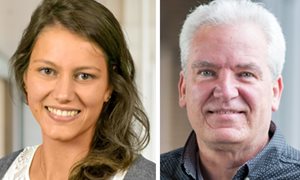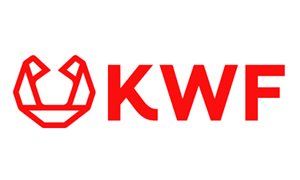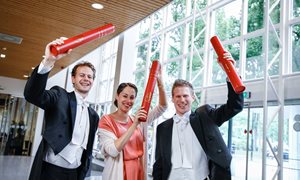5 September 2019
As a I child I loved animals. I only had a hamster and a cat at home, but I made sure I could walk someone else’s dog regularly or even had a pony to take care off at a later age. I could always be found on (someone else’s) farm, spending time between the chickens, rabbits, goats etc during the weekends. I was an energetic child and brave, I was not afraid to help my dad renovating the kitchen. Also, I always wanted to know how thinks work the way they do and I was curious about the unknown.
Additionally, I do think that combination therapies can bring cancer treatment to the next level. This is then also the reason why I am working at the Radiotherapy department. With radiotherapy tumor antigens are released, providing immune cells with information what they need to attack. With blocking the immune suppressive capacities of tumor-specific glycan molecules, we might boost immune cells nature ability to eliminate cancer cells. However, when and how we should combine immunotherapy and radiotherapy to obtain maximum results is an unexplored field and provides a challenge for future research.
b) Theater or cinema? : Theater
c) Dine out or dine in? : Dine in
d) Ferrari or Fiat? : Fiat
e) Shopaholic or chocoholic? : Chocoholic
f) Culture or Nature : Nature

When you were a kid what did you want to be when you grew up? Can you tell us something about your child years.
I always wanted to work as an emergency medical technician (ambulance-verpleegkundige) or to be a veterinarian.As a I child I loved animals. I only had a hamster and a cat at home, but I made sure I could walk someone else’s dog regularly or even had a pony to take care off at a later age. I could always be found on (someone else’s) farm, spending time between the chickens, rabbits, goats etc during the weekends. I was an energetic child and brave, I was not afraid to help my dad renovating the kitchen. Also, I always wanted to know how thinks work the way they do and I was curious about the unknown.
What was your previous academic training, where did you study and why that study?
I studied Animal Science at Wageningen University and Research. I decided to study Animal Science because I wanted to know how animals’ function, I wanted to know more about animal physiology. By then, I didn’t want to become a veterinarian anymore, the routine work and the surgical procedures doesn’t fit me. During my bachelors I became familiar with Immunology and knew that was the field I was interested in. Also, my curiosity grew and became bigger and bigger, which motivated me to work as a scientist. Although animals are still my biggest hobby, I switched to human immunology at the end of my masters. I have done my PhD in the field of tumor immunology at Amsterdam AMC, location VUmc. In more detail, with my PhD project I researched the effect of tumor-associated glycan structures on the anti-tumor immune response.The RIMLS motto is: ‘Today’s molecules for tomorrow’s medicine’. What does this mean for you?
In my current work as Postdoc I continued with my research about the effect of tumor-associated glycan structures on tumor immunity. We, and many other researchers, have found that these tumor-specific glycan molecules (independent of the tumor type) are able to effectively dampen immune responses. In this way, cancer cells exploit these glycan molecules to evade immune attack. Today we need to understand better the mechanism behind it, and then tomorrow, we might be able to develop new cancer immunotherapeutic targeting these glycan molecules.Who is your great example as scientists? And please give a motivation why.
There is no one specific person that functions as a great example for me. In my scientific carrier, I have met many great scientists. Scientists that are intrinsically motivated to solve the scientific puzzle, are the ones that can passionately talk about their work and present their data in a solid way. I want to pursue that, being a scientist in a field that I like and performing science with passion that in turn can motivate others.Which research discovery that you have made has made you most proud?
I am not most proud about one specific result or published article. I am proud of my work when it does have an impact. Of course, publishing in a high impact paper is what I aim to achieve, but the level of impact doesn’t necessarily have to be big all the time. It can just be as simple as coming up with new ideas or sharing knowledge to help your colleagues.Given unlimited finance what experiment would you perform?
I truly believe that tumor-specific glycan structures are, at least partly, responsible for the development of an immune suppressive tumor microenvironment. With unlimited finance I would dedicate my time to research the effect of every glycan molecule known to be present on tumor cells and what kind of effect is has on every single immune cell subset. Including by which receptor the glycan molecule binds on the immune cell and how it influences the downstream signalling of the immune cell. At the moment this is very challenging as the glycosylation machinery is a very complex system with many varieties. I would take a lot of money and time to get the complete picture.Additionally, I do think that combination therapies can bring cancer treatment to the next level. This is then also the reason why I am working at the Radiotherapy department. With radiotherapy tumor antigens are released, providing immune cells with information what they need to attack. With blocking the immune suppressive capacities of tumor-specific glycan molecules, we might boost immune cells nature ability to eliminate cancer cells. However, when and how we should combine immunotherapy and radiotherapy to obtain maximum results is an unexplored field and provides a challenge for future research.
What does your working area (desk, office) look like and what does it say about you (or your research)?
My desk is not messy and not covered with too many papers, I work in a well-organized manner and do have almost everything digital. Every day there are some fruits and/or vegetables are on my desk, especially in the summer. I do like to farm my own vegetables and since February this year, I live in an old (1900-1910) farmhouse with my own apple, pear and plum threes.What type of person are you, quick insights:
a) Mac or PC? : PCb) Theater or cinema? : Theater
c) Dine out or dine in? : Dine in
d) Ferrari or Fiat? : Fiat
e) Shopaholic or chocoholic? : Chocoholic
f) Culture or Nature : Nature
Related news items

Villa Joep Research Grant for Radiotherapy & OncoImmunology (ROI) lab
1 December 2021 Renske van den Bijgaart and Gosse Adema from the Radiotherapy & OncoImmunology laboratorium in collaboration with the Prinses Maxima Center received a grant from Villa Joep of 410k Euro. go to page
2.5 million Euros for cancer research into ovarian cancer and immunotherapy
15 April 2021 The Radboudumc receives 2.5 million Euros from the Dutch Cancer Society (KWF) for three studies to ensure oncological progress during COVID-19 period. go to page
RIMLS PhD grants awarded to eight RIMLS (j)PI's
12 September 2019 Recently, RIMLS held an internal call for Radboudumc junior researcher (PhD) positions. Congratulations for all the awardees and all the best in conducting the research projects. go to page


